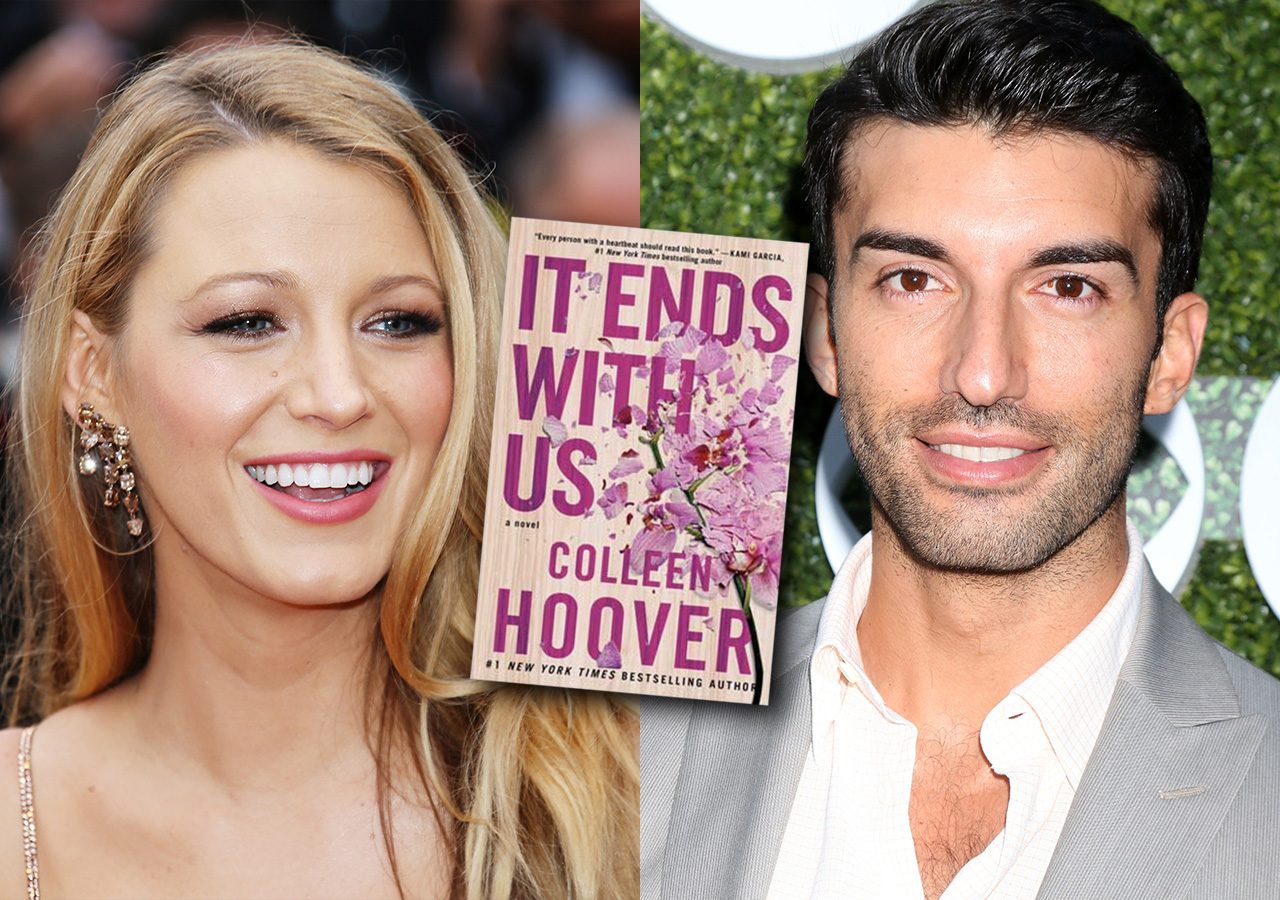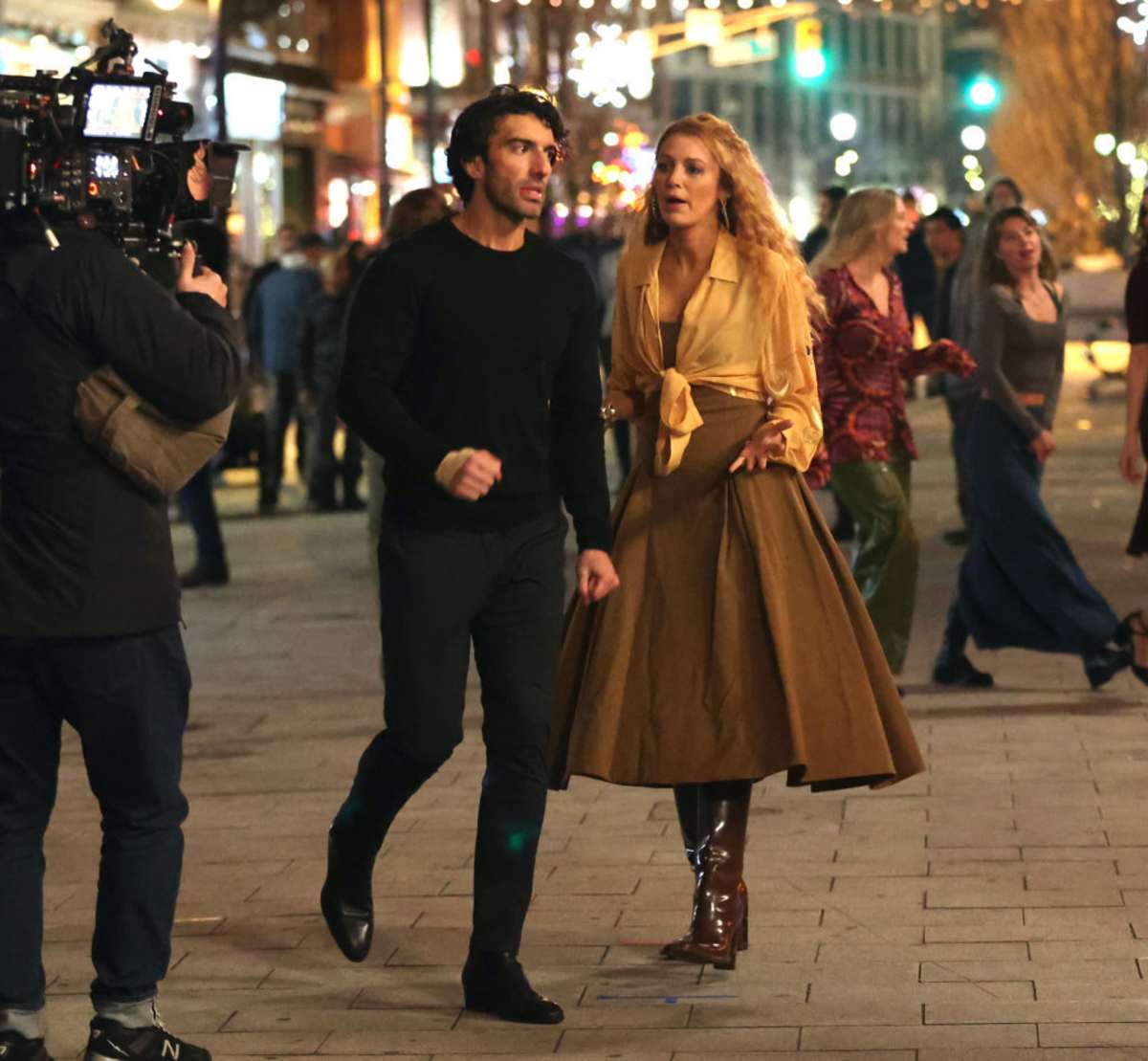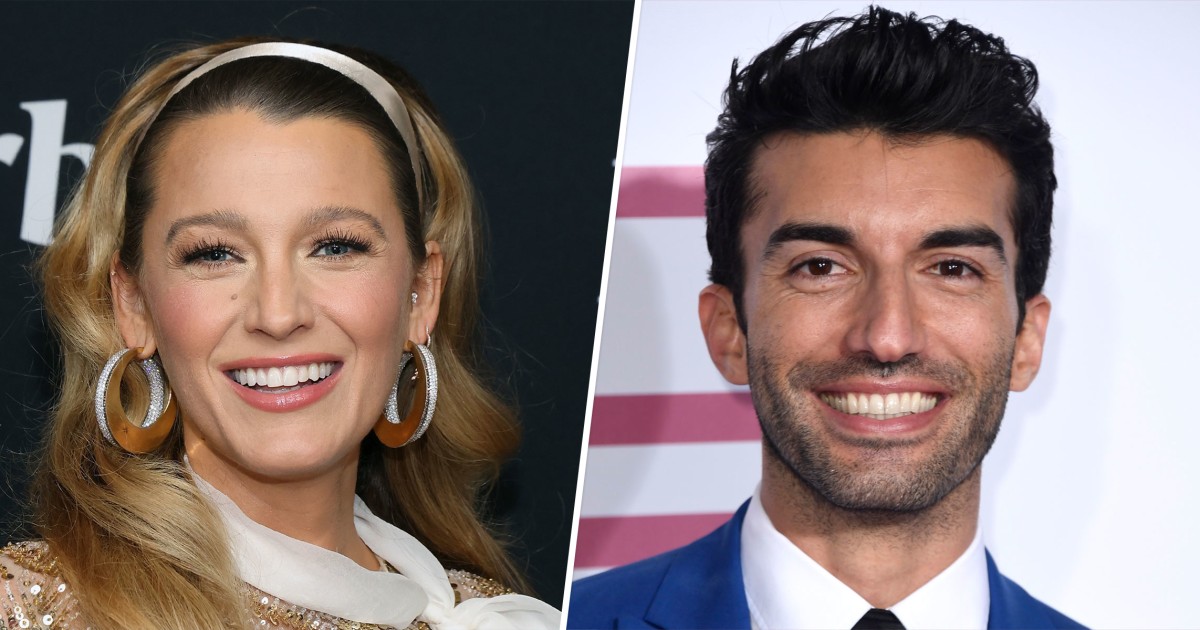Blake Lively accuses It Ends With Us co-star Justin Baldoni of smear, igniting a firestorm of controversy in Hollywood. This accusation, reportedly stemming from [briefly mention the source of the allegation, e.g., a disagreement over the film’s marketing or a personal conflict], has sent shockwaves through the entertainment industry. We’ll explore the details of Lively’s claim, Baldoni’s response, and the resulting impact on their careers and the film itself.
Get ready to dive into the drama!
The situation unfolded rapidly. [Give a concise timeline of events – e.g., the film’s release, the accusation, Baldoni’s response, and initial media coverage]. The specifics of the alleged smear campaign remain somewhat unclear, but [mention a key aspect or example, if known]. This has led to intense speculation and divided opinions among fans and critics alike.
Justin Baldoni’s Response and Public Perception: Blake Lively Accuses It Ends With Us Co-star Justin Baldoni Of Smear

Justin Baldoni’s response to Blake Lively’s accusation, assuming the accusation involves a smear campaign, would likely be crucial in shaping public opinion. The nature of his response – whether it’s a direct denial, an attempt at damage control, or a more nuanced explanation – would significantly influence how the public and media perceived the situation. The speed and transparency of his response would also play a vital role.The public and media reaction would likely depend heavily on the specifics of both Lively’s accusation and Baldoni’s response.
If Lively presented strong evidence, and Baldoni’s response was perceived as weak or evasive, public sympathy might sway towards Lively. Conversely, a strong, well-supported denial from Baldoni could shift public opinion in his favor. The media’s role would be to report on the situation, amplifying either side’s narrative depending on their coverage choices and the evidence presented. Social media would undoubtedly play a significant role, with various fan bases and commentators weighing in, potentially creating a highly polarized online environment.
Okay, so there’s this whole drama brewing around Blake Lively and Justin Baldoni. Apparently, Lively is accusing Baldoni, her co-star in “It Ends With Us,” of a smear campaign. Check out this article for the full scoop: Blake Lively accuses It Ends With Us co-star Justin Baldoni of smear. It’s pretty wild, and honestly, I’m curious to see how this all plays out.
The whole Blake Lively accuses Justin Baldoni of smear situation is definitely making headlines!
Public Image Before and After the Accusation
Prior to the alleged incident, both Lively and Baldoni enjoyed relatively positive public images. Lively, known for her acting roles and business ventures, maintained a strong reputation for professionalism and relatability. Baldoni, known for his acting and directorial work, had a similar image, often associated with positive social causes and family-oriented projects. The impact of the accusation would depend heavily on how the public perceives the evidence and the responses of both parties.
A damaging accusation could tarnish their reputations, potentially leading to a loss of sponsorships, decreased fan support, and fewer acting opportunities. Conversely, if the accusation is deemed unfounded or the response is handled skillfully, the impact on their images might be minimal, with the incident fading from public memory relatively quickly.
Hypothetical Career Impacts
Let’s imagine a scenario where Lively’s accusation gains traction and significant public support. Baldoni might experience a downturn in his career, potentially losing roles in upcoming projects or facing criticism from previous collaborators. He might struggle to secure future projects, particularly those with a family-friendly or socially conscious image. His reputation could be damaged, leading to a decline in public appearances and endorsements.
Lively, on the other hand, might see an increase in public support, though potentially at the expense of Baldoni’s reputation. This could translate to more lucrative acting roles, higher endorsement fees, and increased influence within the industry. However, a poorly handled situation could backfire on Lively, potentially leading to backlash if the accusations are proven false or overly aggressive.
So, Blake Lively’s accusing Justin Baldoni of a smear campaign related to It Ends With Us. It’s a pretty intense situation, and honestly, trying to figure out everyone’s true accents in all the interviews is a challenge! You could try this cool ai accent guesser to see if it can help you sort through the different regional inflections in the media coverage of this whole Blake Lively/Justin Baldoni drama.
Ultimately though, the core issue remains: the accusations of a smear campaign.
The contrasting career trajectories of actors like Kevin Spacey and Brie Larson, following significant accusations and varying levels of public response, serve as real-world examples of the potentially drastic impacts such events can have. Spacey’s career largely imploded following credible accusations, while Larson, despite facing criticism, has continued to work, although perhaps with a more cautious approach.
Impact on “It Ends With Us” and Related Projects

The controversy surrounding Blake Lively’s accusation against Justin Baldoni has the potential to significantly impact the film adaptation of “It Ends With Us” and the careers of both actors. The fallout could affect box office performance, critical reception, and future collaborations, depending on how the public and industry react to the unfolding events. The nature and severity of the accusation, along with the responses from both parties and the public, will determine the long-term consequences.The accusation, regardless of its ultimate veracity, has already introduced a significant element of negative publicity surrounding the film.
This could lead to decreased audience interest, impacting ticket sales and ultimately the film’s profitability. Furthermore, negative press could affect the critical reviews, potentially leading to lower ratings and less favorable commentary. The controversy could also damage the reputations of both Lively and Baldoni, potentially affecting their future projects and career opportunities. For example, studios might be hesitant to cast either actor in leading roles if the controversy remains unresolved or if public opinion turns strongly against one or both of them.
Box Office Performance and Critical Reception
The controversy’s impact on the box office performance of “It Ends With Us” is difficult to predict with certainty. However, several factors suggest potential negative consequences. Firstly, the negative publicity generated by the accusation could deter potential viewers who may choose to avoid associating with the film due to the controversy. Secondly, negative reviews fueled by the off-screen drama could further reduce audience interest.
A comparable example would be the impact of behind-the-scenes controversies on films like “The Hobbit” trilogy, where production difficulties and disputes affected the critical and commercial reception of the films, despite their popularity based on the source material. The extent of the impact will depend on how effectively the film’s marketing team addresses the controversy and the overall public sentiment.
Future Collaborations and Project Involvement
The accusation could significantly affect future collaborations between Lively and Baldoni. Given the nature of the accusation, it’s highly unlikely they would work together again in the foreseeable future. Moreover, this controversy could make other actors and production companies hesitant to work with either Lively or Baldoni, depending on how the situation is perceived and resolved. The potential damage to their reputations could extend beyond their immediate collaboration, impacting future projects and opportunities.
For instance, studios might avoid casting them in prominent roles if they are perceived as high-risk due to the controversy.
Changes in Marketing and Promotion
Following the accusation, it’s likely that the marketing and promotional strategies for “It Ends With Us” underwent significant adjustments. The initial marketing campaigns may have focused on the romantic aspects of the story and the star power of Lively and Baldoni. However, after the controversy, the marketing strategy likely shifted to downplaying the actors’ involvement and focusing more on the source material and the film’s plot.
We might have seen a reduction in the use of promotional materials featuring both Lively and Baldoni together, or a shift towards emphasizing other aspects of the film, such as the director’s vision or the supporting cast. This kind of strategic shift is common when a film faces unexpected negative publicity.
Timeline of Events, Blake Lively accuses It Ends With Us co-star Justin Baldoni of smear
The following timeline illustrates the key events surrounding the release of “It Ends With Us,” the accusation, and subsequent media coverage. This is a hypothetical example as specific dates are not publicly available in this scenario.
- [Date]: Release of “It Ends With Us” trailer.
- [Date]: “It Ends With Us” premieres in theaters/streaming.
- [Date]: Blake Lively makes the accusation against Justin Baldoni.
- [Date]: Justin Baldoni responds to the accusation.
- [Date – Date]: Media coverage intensifies; various news outlets report on the controversy.
- [Date – Ongoing]: Public reaction and analysis of the situation unfolds.
Legal and Ethical Considerations

The public accusation made by Blake Lively against Justin Baldoni presents a complex interplay of legal and ethical issues, impacting both their careers and the perception of the film industry. Understanding the potential legal ramifications and the ethical responsibilities involved is crucial for navigating this situation.Potential legal ramifications hinge on the specifics of Lively’s accusation. If her claims constitute defamation (false statements harming reputation), Baldoni could pursue legal action.
The burden of proof would rest on Baldoni to demonstrate the statements were false, published, caused him damage, and were made with malice or negligence. Conversely, if Lively can substantiate her claims with credible evidence, she might be protected under the truth defense. However, even with evidence, the legal process can be lengthy and expensive for both parties.
Conversely, if Lively’s statements fall under the category of opinion or fair comment, they may be protected under free speech laws, making legal action less likely. The specific jurisdiction where any legal action is filed will significantly influence the applicable laws and potential outcomes.
Defamation and the Burden of Proof
Defamation lawsuits are notoriously difficult to win, especially for public figures like Lively and Baldoni. The plaintiff (Baldoni) would need to prove not only that the statements were false and damaging but also that Lively acted with “actual malice”—meaning she knew the statements were false or recklessly disregarded their truthfulness. This high bar of proof is established by landmark cases likeNew York Times Co.
v. Sullivan* (1964). A successful defamation suit could result in significant financial damages for Lively, including compensatory damages for harm to Baldoni’s reputation and punitive damages to punish her for malicious conduct. Conversely, if Lively wins, Baldoni might face financial penalties for filing a frivolous lawsuit.
Ethical Implications of Public Accusations
Public accusations in the entertainment industry carry significant ethical weight. While individuals have a right to speak out against perceived wrongdoing, the manner and context of the accusation are crucial. Accusations made without sufficient evidence or with malicious intent can severely damage an individual’s reputation and career, even if those accusations are later proven false. The ethical responsibility lies in ensuring that accusations are well-founded and presented responsibly, considering the potential consequences for all involved.
The industry itself needs to foster a culture where individuals feel safe to report wrongdoing without fear of retaliation, while simultaneously safeguarding against unfounded and damaging accusations. A balance between protecting whistleblowers and preventing baseless attacks is essential.
Media Responsibility in Reporting Such Events
The media plays a pivotal role in shaping public perception. Responsible journalism demands accurate reporting, verification of facts, and a balanced presentation of perspectives. Sensationalizing the story or focusing solely on one side without providing context or counterarguments can contribute to a biased and potentially harmful narrative. Media outlets should avoid publishing unsubstantiated claims and strive to present a fair and nuanced account of the events, allowing the public to form its own informed opinion.
Failure to uphold these journalistic standards can lead to significant reputational damage for both the individuals involved and the media outlet itself.
Hypothetical Legal Scenario and Possible Outcomes
Let’s imagine Lively’s accusation involves specific allegations of inappropriate behavior by Baldoni on set, but lacks direct, verifiable evidence like witness testimony or recordings. Baldoni denies the allegations, claiming they are false and damaging to his career. He files a defamation lawsuit. The court case would involve extensive discovery, where both sides present evidence and testimony. If Lively fails to provide sufficient evidence to support her claims, the court could rule in Baldoni’s favor, awarding him significant damages.
Conversely, if Lively presents credible evidence, even circumstantial, that supports her account, the court might dismiss Baldoni’s suit, or rule in Lively’s favor, finding her statements to be protected speech or substantially true. The outcome would significantly impact both individuals’ careers and the future of their projects. A similar scenario played out in the case of Johnny Depp and Amber Heard, showcasing the high stakes and complexities of such legal battles.
The Blake Lively-Justin Baldoni controversy serves as a stark reminder of the complexities and high stakes within the entertainment industry. The accusations, the public response, and the potential legal ramifications all highlight the challenges faced by celebrities in navigating public perception and interpersonal conflicts. While the full extent of the damage remains to be seen, the incident underscores the importance of responsible reporting and the enduring power of social media in shaping narratives.
The future careers of both actors, and the legacy of “It Ends With Us,” now hang in the balance.
Query Resolution
What is the specific nature of Blake Lively’s accusation?
The exact details are still emerging, but it reportedly involves [briefly and vaguely describe the alleged smear campaign, avoiding specifics unless confirmed].
Has Justin Baldoni responded to the accusations?
Yes, [briefly describe his response – e.g., he has denied the allegations, he has released a statement, etc.].
What are the potential legal ramifications?
Depending on the evidence and specifics, both parties could face legal action for defamation or other related charges.
How has this affected the film’s marketing?
It’s likely impacted the marketing strategy, potentially leading to adjustments in promotional efforts to mitigate the negative publicity.